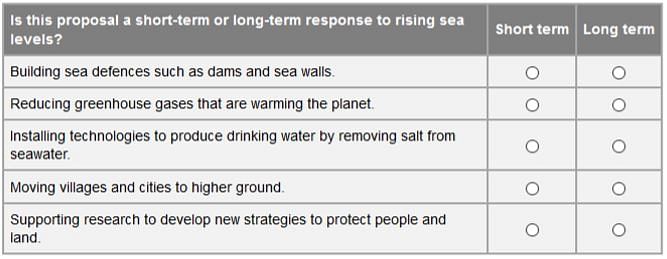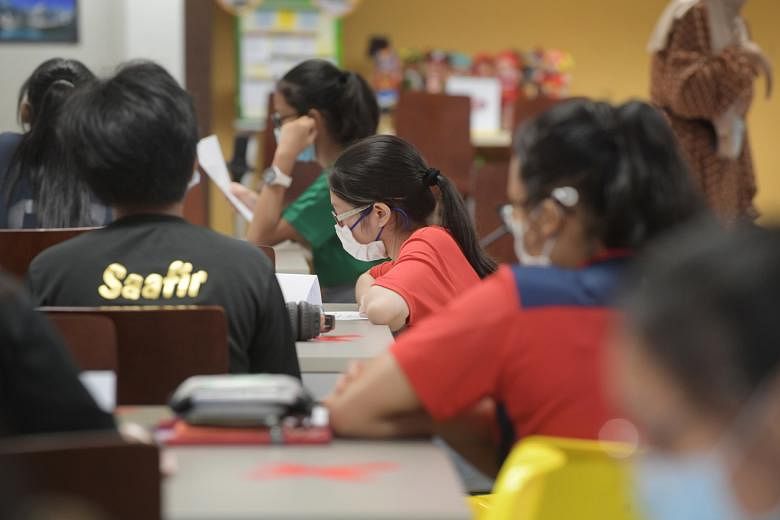SINGAPORE - Students in Singapore know more about issues like climate change and global warming but lack knowledge in other areas like international conflicts.
More than eight in 10 of them said they felt confident explaining issues related to global climate change. These includes, for instance, the impact of carbon-dioxide emissions and why some countries suffer from climate change more than others.
This is higher than the Organisation for Economic Cooperation and Development (OECD) average of about six to seven in 10 students.
This was one of the main findings released on Thursday (Oct 22) from the global competence segment of the Programme for International Student Assessment (Pisa), an international benchmarking study conducted by the OECD.
About 6,670 students in Singapore took part in the study in 2018. They were then 15 years old.
While they fared well in their knowledge of climate change, they were less familiar with other topics, just like their OECD peers.
Some 66 per cent of the Singapore students said they knew something about international conflicts and could explain it to some extent. And 64 per cent reported the same for global health issues such as epidemics.
More than 70 per cent of students here said they were familiar with world issues like hunger or malnutrition, and the causes of poverty.
However, they were also less certain when explaining matters related to the global economy.
For instance, only about half of them could "establish a connection between prices of textiles and working conditions in the countries of production". The OECD average was 58 per cent.
Commenting on the findings, the Ministry of Education (MOE) said: "Through subjects such as science, geography and social studies, our students are exposed to topics like climate change, the driving forces of globalisation, and racial or religious conflicts."
The ministry said it will continue to encourage students to read widely, so that they gain a better understanding of global issues and deeper appreciation of different perspectives and cultures.
As part of next year's refreshed character and citizenship education curriculum (CCE), discussions of contemporary issues will be included in lessons, it added.
Across the sciences, students will deepen their understanding of global and national health issues, such as diabetes, air pollution and the Covid-19 pandemic.
In humanities, students now learn about issues related to global health.
From 2021, the revised syllabuses will see geography students studying issues related to sustainable development, such as the health and well-being of world populations.
English language and mother tongue language teachers are also encouraged to use news and current affairs to engage students, said MOE.
The Pisa 2018 study also uncovered other findings, one of which was that Singapore students reported being less able to adapt to new situations or challenges.
Only half of them said that they can deal with unusual situations, compared with the OECD average of 59 per cent.
Similar to their OECD peers, about half of students here said they could adjust to a new culture, while 55 per cent of them indicated that they could adapt to different situations even when under stress or pressure.
The MOE said that Pisa 2018 noted that students who are better able to adapt to novel or challenging situations tend to be more resilient.
The ministry added that it will continue to work on building confidence in students as they face challenges, through learning opportunities such as CCE.

Pisa 2018 sample questions for global competence cognitive assessment
Rising Sea Levels
Overview: This unit begins with a brief introduction that describes the effects of rising temperatures on sea levels. This introduction sets the stage for the items exploring the effects of rising sea levels on individuals who live in areas of low elevations such as islands and coastal areas.
The unit focuses on a fictional place where sea levels have risen and displaced the inhabitants of the islands, making them climate refugees. This unit has a focus on socio-economic interactions and interdependence.
1. The student is asked to provide one challenge that climate refugees would face when moving to a new place.
Question: In cases such as the one in Travina, citizens may be forced to become "climate refugees". Climate refugees are people who are forced to leave their communities or countries because of environmental disasters.
What is one challenge that climate refugees would be likely to face when moving to a new place?
Credited response: Four broad categories of challenges relevant for climate refugees are communication difficulties; financial/economic difficulties; difficulties adjusting to life in a new place; and difficulties associated with leaving or losing the community or home and/or finding a new place to live.
Level of proficiency: Level 1
2. The student is to consider a set of proposals and identify which represent short-term responses (to a more immediate need) and which represent long-term responses (to more systemic causes) to rising sea levels.
Question: In order to deal with the threat of rising sea levels, both short-term and long-term responses are needed. Short-term responses have an immediate impact or provide a solution in a short period of time. Long-term responses require more time before they have an impact.
Identify each of the proposals below as either short-term or long-term response to rising sea levels. Click on either short term or long term for each proposal.

Credited response: The correct responses were short term, long term, short term, short term, long term.
Level of proficiency: Level 5 as it requires knowledge about global issues, critical evaluation of actions and consequences, and response on a complex multiple-choice format.
Language policy
Overview: This unit is about a fictional country, Armaz, where the fictional language, Ursk, is spoken. A group of Ursk-speaking lawmakers proposed a policy that would require all public schools to teach all classes, except foreign-language classes, in Ursk.
There are a number of citizens in Armaz who speak Jutanese, which is a minority language in Armaz but is spoken widely outside its borders. They are concerned about the effects of this policy.
In this unit, Pisa students must consider the impacts of the policy and reason through its possible consequences. The unit focuses on perspective taking, stereotypes, discrimination and intolerance and the ability to identify and understand the consequences of actions.
3. The student is asked to consider four possible consequences and determine which one would be the most serious if the Ursk-only policy is enacted. All consequences are possible, but one summarises a serious potential consequence of the policy.
Question: Some school administrators who support single-language policy have proposed that special schools be set up for Jutanese-speaking students so that they can learn Ursk. The administrators claim that doing this will make it easier to teach these students.
If special schools were created, which of the following would be the most serious potential consequence for students?
A. Speakers of other minority languages could be encouraged to request their own schools.
B. Having special schools might reinforce any existing social divisions based on language.
C. Special schools could not be opened until the new policy was approved.
D. Having special schools could decrease the number of students attending regular schools.
Credited response: The correct response is B.
Level of proficiency: Level 3 as it requires students to consider the fact that a special school would remove Jutanese-speaking students from the general population.
By isolating a group of students, the Ursk-speaking students would have fewer personal interactions with them, which could lead to Ursk-speaking students relying on generalisations and stereotypes rather than interactions with individuals. This could then lead to widening divisions between Ursk and Jutanese speakers.


